|
|
|
Sort Order |
|
|
|
Items / Page
|
|
|
|
|
|
|
| Srl | Item |
| 1 |
ID:
155291
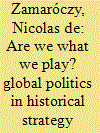

|
|
|
|
|
| Summary/Abstract |
Building upon current interest in studies of how popular culture relates to global politics, this article examines one hitherto overlooked aspect of popular culture: computer games. Although not prominent in the field of International Relations (IR), historical strategy computer games should be of particular interest to the discipline since they are explicitly designed to allow players to simulate global politics. This article highlights five major IR-related assumptions built into most single-player historical strategy games (the assumption of perfect information, the assumption of perfect control, the assumption of radical otherness, the assumption of perpetual conflict, and the assumption of environmental stasis) and contrasts them with IR scholarship about how these assumptions manifest themselves in the “real world.” This article concludes by making two arguments: first, we can use computer games as a mirror to critically reflect on the nature of contemporary global politics, and second, these games have important constitutive effects on understandings of global politics, effects that deserve to be examined empirically in a deeper manner.
|
|
|
|
|
|
|
|
|
|
|
|
|
|
|
|
| 2 |
ID:
155294
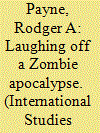

|
|
|
|
|
| Summary/Abstract |
In recent years, many international relations scholars have been discussing films, books, and television programs featuring zombies, largely because such narratives are thought to provide a compelling metaphor for thinking about a diverse array of contemporary threats. These range from relatively traditional threats posed by violent terrorists to nontraditional threats from epidemics or mass migration. However, because zombie narratives are generally apocalyptic, employing them can provide a misleading and dangerous understanding of international security. By contrast, satirical and comedic zombie stories provide interesting alternative narratives that coincide with the emancipatory objectives of critical security studies. Satirical narratives focusing on elites characteristically critique these powerful figures, often revealing them to be self-centered buffoons. Indeed, satire and black comedy can be quite subversive, reflecting critical and potentially transformative notions—about threats and other dimensions of security politics. Comedies typically center upon ordinary people, emphasize their regular lives, and end happily—aligning with the aspirations of the human security agenda.
|
|
|
|
|
|
|
|
|
|
|
|
|
|
|
|
| 3 |
ID:
155292


|
|
|
|
|
| Summary/Abstract |
Popular culture is a significant interest for scholars of International Relations and world politics. This article explores the capacity of video games to articulate, represent, and simulate the practice of international politics in both narrative and procedural capacities through a study of the highly popular Mass Effect science fiction series of video games. The introduction of procedural rhetoric as a means of textual criticism is argued to address existing concerns within the study of International Relations to articulate the significance of representation with cultural texts and to extend the implications of claims about science fiction as a compelling set of contingent arguments about the broader sphere of social life that constitutes International Relations.
|
|
|
|
|
|
|
|
|
|
|
|
|
|
|
|
| 4 |
ID:
155293
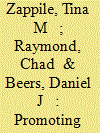

|
|
|
|
|
| Summary/Abstract |
We introduce a real-time problem-based simulation in which students are tasked with drafting policy to address the challenge of internally displaced persons in post-earthquake Haiti from a variety of stakeholder perspectives. Students who participated in the simulation completed a quantitative survey as a pre-/post-test on global empathy, political awareness, and civic engagement and provided qualitative data through post-simulation focus groups. The simulation was run in four courses across three campuses in a variety of instructional settings from 2013 to 2015. An analysis of the data reveals that scores on several survey items measuring global empathy and political/civic engagement increased significantly after the simulation, while qualitative student comments corroborated the results. This format of a real-time problem-based policy-making simulation is readily adaptable to other ongoing and future global crises using the framework provided in this paper.
|
|
|
|
|
|
|
|
|
|
|
|
|
|
|
|
| 5 |
ID:
155295
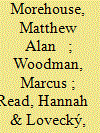

|
|
|
|
|
| Summary/Abstract |
Can quantitative methods training be successfully fused with content courses? With the continuing rise of “Big Data,” familiarity with quantitative research methods is an increasingly necessary skill set in the workplace. This article provides an in-depth “how-to” guide and framework for implementing methods training into content courses. In this program, students (in both lower and upper division courses) carry out dataset construction, along with data analysis, using the R, R commander, and Gretl statistical programs. Tips are provided for addressing issues that instructors and students may face. Finally, discussions and reflections from the course instructor and representative students suggest that integrating quantitative methods training into topical courses can provide students with a greater appreciation and understanding of social scientific research, along with providing them with a toolkit of skills that can be expanded upon and assist them in the job market.
|
|
|
|
|
|
|
|
|
|
|
|
|
|
|
|
| 6 |
ID:
155290
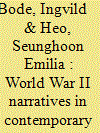

|
|
|
|
|
| Summary/Abstract |
This article explores narratives that university students in Germany and Japan tell about World War II. Studying these narratives offers insights into how conflict, reality, and knowledge are socially constructed. Scholars in reconciliation and memory studies have mainly focused on the differences between how Germany and Japan choose to remember their wartime pasts in history curricula and textbooks. However, little is known about how far these official versions of history are reproduced or challenged by university students. Working with data collected through an online survey, our findings address this question by making two arguments: first, the depth of World War II knowledge and the variety of knowledge sources students were exposed to affect whether students engage in a reflective or non-reflective characterization of their home countries’ role. This appears to be primarily influenced by the national knowledge environment students find themselves in. Second, while students surveyed tended to reproduce official narratives, both Japanese and German students also displayed critical engagement with World War II history teaching and knowledge in their countries.
|
|
|
|
|
|
|
|
|
|
|
|
|
|
|
|
|
|
|
|
|